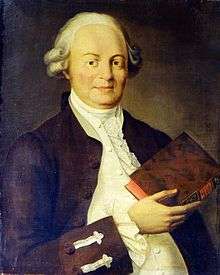Vasily Trediakovsky

Vasily Kirillovich Trediakovsky (Russian: Васи́лий Кири́ллович Тредиако́вский (Тредьяко́вский); 5 March [O.S. 22 February] 1703 in Astrakhan – 17 August [O.S. 6 August] 1769 in Saint Petersburg) was a Russian poet, essayist and playwright who helped lay the foundations of classical Russian literature.[1]
Trediakovsky was a Russian literary theoretician and poet whose writings contributed to the classical foundations of Russian literature. The son of a poor priest, Trediakovsky became the first Russian commoner to receive a humanistic education abroad, at the Sorbonne in Paris (1727–30) where he studied philosophy, linguistics and mathematics.[1] Soon after his return to Russia he became acting secretary of the Academy of Sciences and de facto court poet.
In 1735 Trediakovsky published Новый и краткий способъ къ сложенью российскихъ стиховъ ("A new and brief way for composing of Russian verses"), a highly theoretical work for which he is best remembered.[1] It discussed for the first time in Russian literature such poetic genres as the sonnet, the rondeau, the madrigal, and the ode. In 1748 appeared his Разговор об орфографии ("A Conversation on Orthography"), the first study of the phonetic structure of the Russian language. He continued his advocacy of poetic reform in О древнем, среднем и новом стихотворении российском (1752; "On Ancient, Middle, and New Russian Poetry").
Trediakovsky was also a prolific translator of classical authors, medieval philosophers, and French literature. His translations frequently aroused the ire of the censors, and he fell into disfavour with his Academy superiors and conservative court circles. In 1759 he was dismissed from the Academy. His last major work was a translation of François Fénelon's Les aventures de Telemaque (1766; Tilemakhida), which he rendered in Russian hexameters. His works marked the transition from syllabic versification to metric verse, more suited to the sound of the Russian tongue.
See also
- Mikhail Lomonosov, who created the basis of the modern Russian literary language
References
- 1 2 3 Berlin, Isaiah (2008). Russian Thinkers. Penguin Classics. pp. 379–380. ISBN 978-0-14-144220-4.